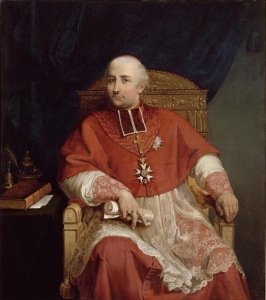Joseph Fesch
Joseph Fesch (Ajaccio, 3 January 1763–Rome, 13 May 1839) was born to François Fesch, a Swiss captain in the employ of the Republic of Genoa and Angela–Maria Pietrasanta, the widow of Giovanni–Geronimo Remolino, who fifteen years earlier, in 1750, had given birth to Letizia, the future mother of Napoleon.
The maternal half–brother of Letizia, uncle of the man who would become Emperor, became a priest prior to the outbreak of the French Revolution, after which he adhered to the Civil Constitution of the Clergy, then renouncing the cassock and following his nephew in the First Italian Campaign as Commissioner of the French army. After the agreement between Napoleon and Pope Pius VII in 1801, he returned to the Church, first becoming Archbishop of Lyon and then Cardinal of San Lorenzo in Lucina, as well as the French Ambassador to Rome. In this latter role he negotiated and obtained the presence of Pius VII at the imperial coronation of Napoleon in Paris on 2 December 1804 and prepared the coronation as King of Italy that took place on 1805.
His unconditional support for his nephew’s politics led him to the post of Grand Chaplain of the French Empire, but when tensions between Napoleon and the pope led to the rupture of their relations, Joseph Fesch sided with the papacy, thereby losing all of his benefits. Exiled to Rome in 1814, he took up residence in the Palazzo Falconieri thanks to the magnanimity of Pius VII and spent the rest of his life dedicating himself to art and beneficence.
Always tied to his birth city, where he was Archdeacon before the French Revolution, he turned his attention there, enacting numerous charitable works and building a kind of modern study centre, Palazzo Fesch, which received the cardinal’s extraordinary art collection at his death in 1839.










